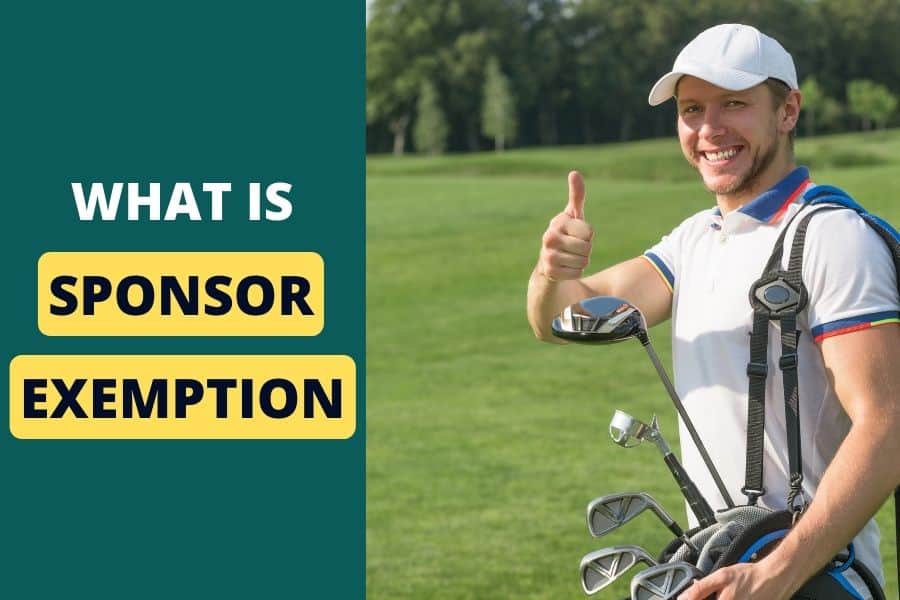What Is A Sponsor Exemption In Golf, And How Do They Work?

Learn what is a sponsor exemption in golf and how they work. Understanding the concept of sponsor exemptions can help you kick-start your golf career.
I. What is a sponsor exemption?
A sponsor exemption in golf is an invitation by the tournament sponsor to participate in the event without having to qualify. This enables up-and-coming golfers to compete who might not otherwise have the necessary credentials to do so.
These exemptions are granted to certain players based on their track record or potential, allowing them to participate in tournaments without qualification.
Typically, the tournament administrator selects the players for sponsor exemptions. Each professional golf tournament has a specific number of spots that the sponsor can fill with their preferred players.
Golfers have limits on the number of sponsor exemptions they can accept in a year, although this varies depending on the tour. PGA Tour members have no limit on sponsor exemptions, while non-members are only allowed to accept up to 7.
II. How do golfers get sponsor exemptions?
The sponsor’s exemption is distinct from obtaining a PGA Tour card or qualifying via a Monday qualifier. The invitation can come from someone affiliated with the tour, such as an official, assistant coach, or caddy.
In addition, players may be able to obtain a sponsor exemption via their performance in previous events such as college tournaments, US Open qualifications, and amateur competitions.
Golfers can ask tournament administrators for sponsor exemptions in writing, but there’s a maximum of eight per tournament. The top 125 players on tour get full exemptions for the following year, while players ranked 126-150 receive conditional status. Golfers returning from injury layoffs may also ask for exemptions.
III. Who gets the sponsor exemptions?
When it comes to granting golf tournament invites, the decision-making process involves the tournament administrator and committee, who consider various factors in making their decisions. Here are a few of the golfers who are most likely to receive sponsor exemptions:
1. Club members
Private country clubs occasionally host golf tournaments and may offer sponsor exemptions to club members who play at the club every day. These exemptions are typically not expected to make it to play or win the finals, but they still provide a positive experience for the player.
2. Local residents
Tournament directors frequently offer exemptions to young and local players to play in PGA Tour events.
Many of these players strive for these opportunities, just like Jordan Spieth did in 2010. Several current and former stars have also received sponsor exemptions as young players and are currently performing excellently in their professional golf careers.
3. Former champions and PGA stars
Less prestigious golf tournaments often invite well-known former stars to join the lineup to attract more spectators. Former champions of an event are also likely to be invited to play if they haven’t qualified.
4. Current PGA/Korn Ferry Member
Tournaments are generally required to allocate a minimum of two exemptions to current PGA Tour-exempt players and Korn Ferry Tour finalists from the previous year who did not qualify otherwise. All tournament organizers aim to make the field as competitive as possible.
Therefore, if a player is not otherwise exempt but has been playing well, sponsors are likely to select them. Sahith Theegala and Will Zalatoris are excellent examples of sponsor exemptions in the past two years.
Are sponsor exemptions hard to get?
Obtaining a sponsor exemption is not easy and requires a great deal of time, skill, and commitment to the sport. However, gaining popularity and recognition in your local community could be your ticket to sponsorship.
Amateur golf tournaments, US Open qualifications, and other achievements may be necessary for attaining sponsor invitations. Newcomers to the sport should not expect to get an exemption without putting in the time to develop their game.
IV. What is a sponsor exemption in the PGA tour events?
PGA tour event players require a card to compete in major tournaments. However, sponsors of events may provide exemptions for players who wouldn’t typically be eligible.
These sponsor exemptions, which are usually valid for a couple of years, enable those golfers to compete and can only be accepted up to a certain number each year (depending on the tour).
Recent examples include Turk Pettit earning an exemption in the 2022 Wells Fargo Championship, where his stellar performance allowed him to make the cut.
How much do sponsors pay PGA golfers?
Golfers on the PGA Tour can generate generous rewards through sponsorships and events. The sponsorship money earned depends on the player’s popularity and the sponsor’s profile.
Besides money, sponsorships provide an excellent opportunity to network and act as a platform to boost brand recognition. However, it’s important to thoroughly research potential sponsors before signing any deal in order to maximize profits.
Who has a lifetime exemption on the PGA Tour?
Vijay Singh and Davis Love III are the only current PGA Tour players with lifetime membership status.
However, other well-known players such as Tiger Woods, Phil Mickelson, and Greg Norman also have this status but don’t currently need it. This is because they are still competing and winning high-level tournaments and do not need to rely on their lifetime membership status to gain entry into events on the golf tour.
Generally, lifetime membership offers perks like invitations to major championships and discounts at sponsor events. To qualify for this tour status, a player must have been active for 15 years and won at least 20 tournaments.
How many sponsor exemptions are available for each tournament?
Sponsor exemptions are limited and vary depending on the tour, and even within the same tour, the usage of sponsor exemptions can differ.
For instance, the PGA Tour allows up to eight sponsor exemptions for standard events, and FedEx playoff tournaments do not offer any sponsor exemptions. The four majors have their own rules for awarding exemptions.
Is it actually the sponsor making the choices?
While the tournament’s sponsor can suggest potential players for a sponsor exemption, it is ultimately up to the tournament director to decide who receives the exemption. They may consider a player’s past performances, rankings, and potential to bring attention to the tournament when deciding who to offer a sponsor exemption to.
V. Does the Korn Ferry tour have sponsor exemptions?
The Korn Ferry Tour offers sponsor exemptions for promising golfers and players who have not made it to the PGA Tour. These are based on performance in tournaments and notable career achievements.
This year (2023), the tour has also introduced an exemption to the US Open for the player with the highest number of points. The Korn Ferry Tour serves as a feeder tour and provides an opportunity for aspiring professionals to make it big on the PGA Tour.
What is a 5-year exemption in golf?
Different tournaments offer different exemption periods, ranging from three to five years. Winning a professional golf tournament within the first five years of eligibility exempts a player from other tournaments for that year. Winning multiple times in a year extends the exemption by an additional year per win, up to a maximum of five years.
Do Major Championships have sponsor exemptions?
While most professional golf tournaments offer sponsor exemptions, Major Championships and FedEx Cup playoffs typically do not. These tournaments reserve their spots for some of the highest-ranking professional golfers in the world and pre-fill them before the tournament begins.
VI. Popular sponsor exemptions
Here are some popular sponsor exemptions in professional golf tournaments.
- Dan Bradbury won the Joburg Open on the DP World Tour on a sponsor’s exemption, earning a two-year exemption on tour and a spot in the 2023 Open Championship.
- Tony Romo has played on sponsor exemptions in several PGA and Korn Ferry tour events.
- Matt Wolff won the 3M Open in 2019 on an exemption, which earned him his PGA Tour card for the following year and an invitation to The Masters.
- Jordan Spieth won the 2013 John Deere Classic on a sponsor exemption.
VII. Controversies surrounding sponsor exemptions
While these exemptions provide an opportunity for up-and-coming golfers to gain exposure and experience, they have also been the subject of controversy.
Here are some of the controversies surrounding sponsor exemptions:
- Favoritism: Sponsor exemptions are often given to players connected to the tournament sponsor, such as those represented by the same management company. This has led to accusations of favoritism, with some players receiving multiple exemptions despite having a lower ranking or less experience than others.
- Lack of diversity: Some critics argue that sponsor exemptions disproportionately benefit male golfers and those from affluent backgrounds, while women and players from less privileged backgrounds are less likely to receive them.
- Impact on field quality: Some players also argue that sponsor exemptions can weaken the overall quality of the tournament field by allowing lesser-known players to take the place of more deserving players who have gone through the qualifying process.
Conclusion
Sponsor exemptions play a vital role for aspiring players in securing their spot on tour. They also add an element of excitement for fans to witness new talent in professional golf. However, to maintain competitive standards, sponsors should address issues of favoritism and lack of diversity among those receiving sponsor exemptions.
FAQs
Why are sponsor exemptions given?
Sponsor exemptions are given to players who demonstrate great skill and potential in the sport. These exemptions allow them to compete, grow, and develop their performance at a professional level.
Can amateur golfers get sponsored?
As per the updated Rules of Amateur Status effective from January 1, 2022, amateur golfers can accept paid endorsements/sponsorships, subject to certain requirements under Rule 3-1b of Appendix A – General Regulations of Golf.
The change enables amateur golfers to obtain financial support to assist in their development and training while retaining their amateur status. However, sponsorship deals must follow specific guidelines to avoid violating amateur status rules.
How do sponsorships work in golf?
Sponsorship in golf follows a similar model to other sports, where companies provide financial support for the tournament in exchange for advertising. Sponsors can range from those sponsoring individual holes or dinner events for smaller tournaments. Securing sponsorship deals well in advance is crucial to ensure a seamless event.








